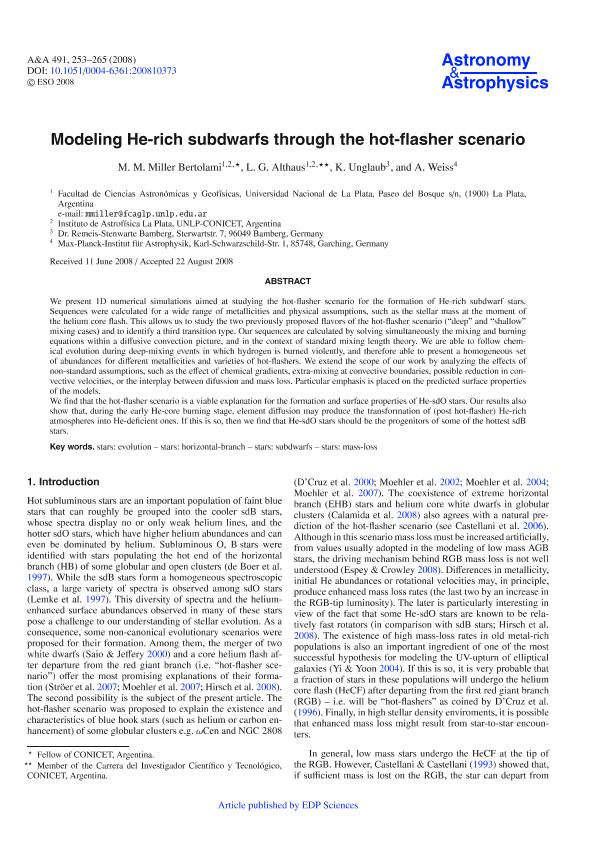Mostrar el registro sencillo del ítem
dc.contributor.author
Miller Bertolami, Marcelo Miguel

dc.contributor.author
Althaus, Leandro Gabriel

dc.contributor.author
Unglaub, K.
dc.contributor.author
Weiss, A.
dc.date.available
2018-04-24T14:43:08Z
dc.date.issued
2008-12
dc.identifier.citation
Miller Bertolami, Marcelo Miguel; Althaus, Leandro Gabriel; Unglaub, K.; Weiss, A.; Modeling He-rich subdwarfs through the hot-flasher scenario; EDP Sciences; Astronomy and Astrophysics; 491; 1; 12-2008; 253-265
dc.identifier.issn
0004-6361
dc.identifier.uri
http://hdl.handle.net/11336/43229
dc.description.abstract
We present 1D numerical simulations aimed at studying the hot-flasher scenario for the formation of He-rich subdwarf stars. Sequences were calculated for a wide range of metallicities and physical assumptions, such as the stellar mass at the moment of the helium core flash. This allows us to study the two previously proposed flavors of the hot-flasher scenario ("deep" and "shallow" mixing cases) and to identify a third transition type. Our sequences are calculated by solving simultaneously the mixing and burning equations within a diffusive convection picture, and in the context of standard mixing length theory. We are able to follow chemical evolution during deep-mixing events in which hydrogen is burned violently, and therefore able to present a homogeneous set of abundances for different metallicities and varieties of hot-flashers. We extend the scope of our work by analyzing the effects of non-standard assumptions, such as the effect of chemical gradients, extra-mixing at convective boundaries, possible reduction in convective velocities, or the interplay between difussion and mass loss. Particular emphasis is placed on the predicted surface properties of the models. We find that the hot-flasher scenario is a viable explanation for the formation and surface properties of He-sdO stars. Our results also show that, during the early He-core burning stage, element diffusion may produce the transformation of (post hot-flasher) He-rich atmospheres into He-deficient ones. If this is so, then we find that He-sdO stars should be the progenitors of some of the hottest sdB stars.
dc.format
application/pdf
dc.language.iso
eng
dc.publisher
EDP Sciences

dc.rights
info:eu-repo/semantics/openAccess
dc.rights.uri
https://creativecommons.org/licenses/by-nc-sa/2.5/ar/
dc.subject
Evolution of Stars
dc.subject
Horizontal-Branch Stars
dc.subject
Subdwarfs
dc.subject
Mass Loss
dc.subject.classification
Astronomía

dc.subject.classification
Ciencias Físicas

dc.subject.classification
CIENCIAS NATURALES Y EXACTAS

dc.title
Modeling He-rich subdwarfs through the hot-flasher scenario
dc.type
info:eu-repo/semantics/article
dc.type
info:ar-repo/semantics/artículo
dc.type
info:eu-repo/semantics/publishedVersion
dc.date.updated
2018-04-23T15:34:43Z
dc.journal.volume
491
dc.journal.number
1
dc.journal.pagination
253-265
dc.journal.pais
Francia

dc.journal.ciudad
Les Ulis, Francia
dc.description.fil
Fil: Miller Bertolami, Marcelo Miguel. Universidad Nacional de La Plata. Facultad de Ciencias Astronómicas y Geofísicas; Argentina. Consejo Nacional de Investigaciones Científicas y Técnicas. Centro Científico Tecnológico Conicet - La Plata. Instituto de Astrofísica La Plata. Universidad Nacional de La Plata. Facultad de Ciencias Astronómicas y Geofísicas. Instituto de Astrofísica La Plata; Argentina
dc.description.fil
Fil: Althaus, Leandro Gabriel. Universidad Nacional de La Plata. Facultad de Ciencias Astronómicas y Geofísicas; Argentina. Consejo Nacional de Investigaciones Científicas y Técnicas. Centro Científico Tecnológico Conicet - La Plata. Instituto de Astrofísica La Plata. Universidad Nacional de La Plata. Facultad de Ciencias Astronómicas y Geofísicas. Instituto de Astrofísica La Plata; Argentina
dc.description.fil
Fil: Unglaub, K.. Dr. Remeis-Stenwarte Bamberg; Alemania
dc.description.fil
Fil: Weiss, A.. Max-Planck-Institut für Astrophysik; Alemania
dc.journal.title
Astronomy and Astrophysics

dc.relation.alternativeid
info:eu-repo/semantics/altIdentifier/doi/http://dx.doi.org/10.1051/0004-6361:200810373
dc.relation.alternativeid
info:eu-repo/semantics/altIdentifier/url/https://www.aanda.org/articles/aa/abs/2008/43/aa10373-08/aa10373-08.html
Archivos asociados
